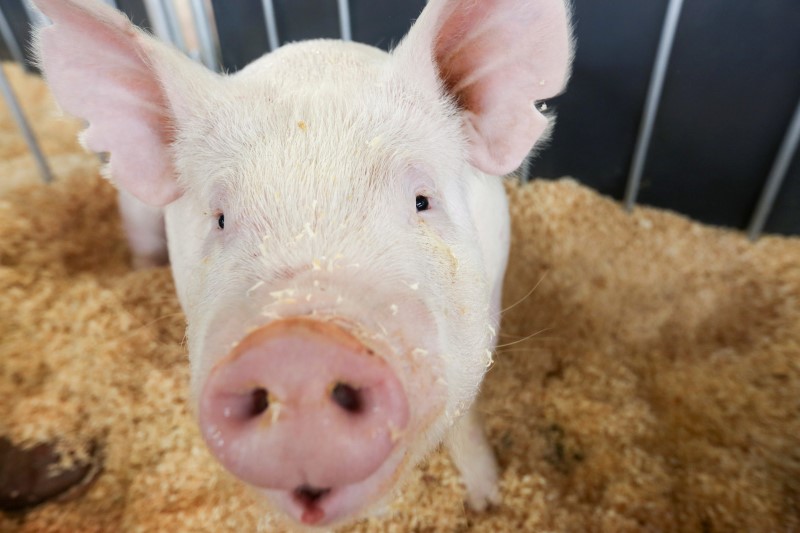* Japan pays premium over domestic buyers for chilled pork
* Pigs' reduced-stress lifestyle helps avoid dry meat
* Trendy Tokyo eatery features Canadian pulled pork salad
By Rod Nickel and Yuka Obayashi
WINNIPEG, Manitoba/TOKYO, Nov 16 (Reuters) - On select Canadian farms, thousands of pigs bound for Japan are getting five-star treatment.
Japan's growing appetite for pricey pork cuts is driving Canadian and U.S. fresh pork exports to record levels, spurring producers to use every advantage to gain market share.
While most of Canadian meatpacker Olymel L.P.'s pigs gobble pedestrian wheat and barley fare, others dine on rations spiced with mint and ginger on a Saskatchewan farm dedicated to fattening hogs bound for Japan, the world's second-biggest importer of the meat.
Some Canadian hogs are indulged with 12 times more rest before slaughter than pigs destined for other markets, to ensure stress does not turn the meat dry. Meanwhile, another hog producer has opened an eatery in a trendy Tokyo district to show off its pork.
"The Japanese consumer is probably the most powerful consumer of pork in the world, and they understand the difference in quality," said Claude Vielfaure, president of the hog-processing company HyLife.
Rich premiums paid by Japanese consumers have fueled intense competition and led to cross-Pacific partnerships between North American hog producer Smithfield Foods SFII.UL and Japanese trading house Sumitomo Corp 8053.T , as well as processor HyLife with trader Itochu Corp 8001.T .
Tyson Foods Inc (NYSE:TSN) TSN.N and Maple Leaf Foods Inc MFI.TO also rank among North America's biggest pork suppliers, while processors NH Foods Ltd 2282.T and Itoham Yonekyu Holdings 2296.T , and meat wholesaler Starzen Co Ltd 8043.T import large volumes of North American chilled pork.
U.S. exporters shipped 147,000 tonnes of chilled pork to Japan from January through August, setting a record-brisk pace, according to the U.S. Meat Export Federation (USMEF). Canada sold C$679 million ($507 million) worth of pork to Japan for the period, its fastest pace in 11 years as measured by value.
The shipments show trade growth is possible based on consumer tastes and favorable prices, due partly to the yen's strength against the greenback and Canadian dollar, even as broad trade deals such as the Trans-Pacific Partnership suffer setbacks. is the second-most consumed meat in Japan after fish, according to USMEF.
PAYING UP
Japanese buyers pay about C$1.20 per kilogram more than domestic buyers, factoring in the exporter's premium, freight and tariffs, said Ray Price, president of Alberta processor Sunterra Group. For a large high-quality loin, that works out to a bump of C$5.40 to the wholesale price.
In September, Manitoba-based HyLife opened a restaurant in a Tokyo business district to enhance its reputation, serving back ribs and pulled pork salad.
HyLife, which is 49 percent owned by Japan's Itochu, is spending up to C$125 million to expand processing and boost Asian sales.
At Lucyporc's Quebec plant, pigs rest in a quiet barn for 16 to 24 hours before slaughter to reduce stress, compared with the industry standard of 2 to 5 hours. The result is juicier, better-tasting tenderloins, said general manager Denis Levasseur.
Olymel, which gives its pigs the ginger- and mint- infused feed, acknowledges the spices do not change the taste of the meat. But it gives the company a marketing edge, said Richard Davies, senior vice-president of sales and marketing.
In the United States, packers Rantoul Foods and Smithfield process hogs that are specially bred for Japan, distributed by Sumitomo and sold as Silky Pork brand.
AGING FARMERS, HIGHER COST
Japan produces just over half of the pork it consumes, limited by farmers' advancing age and the more than double production cost compared with North America, said Takashi Koiso, managing director of the Japan Pork Producers Association. Prime Minister Shinzo Abe's government aims to raise that to 58 percent to satisfy Japan's appetite for dishes such as fried or gingered pork.
The United States and Canada, Japan's two largest offshore chilled pork suppliers, take advantage of shorter shipping times than European competitors, who sell mainly cheaper frozen pork, said Erin Borror, USMEF economist.
Japanese trading house Itoham has doubled chilled pork imports from Canada during the past five years and plans a further boost of 20 percent this year over last year, said spokeswoman Aiko Komeda.
To be sure, Japan is not within everyone's reach.
J.H. Routh Packing Company, a family-owned Ohio processor, sticks to serving U.S. buyers, avoiding the high cost of Japan's specifications.
"We found our niche," said sales manager Tony Stearns. "Trying to go and develop another market, (for which) we would have to buy equipment that costs millions - there's no real value in doing that."
While premiums can be lucrative, Japanese buyers often pay less than domestic buyers in spring, when prices rise, said Dave Bulgarelli, vice-president of sales at Rantoul.
"You have to make what they want, not what you want to sell," he said. ($1 = 1.3389 Canadian dollars)
<^^^^^^^^^^^^^^^^^^^^^^^^^^^^^^^^^^^^^^^^^^^^^^^^^^^^^^^^^^^ Graphic-Canada feeds Japanese hunger for fresh pork
http://tmsnrt.rs/2g2N78L
^^^^^^^^^^^^^^^^^^^^^^^^^^^^^^^^^^^^^^^^^^^^^^^^^^^^^^^^^^^> (Editing by Matthew Lewis)
